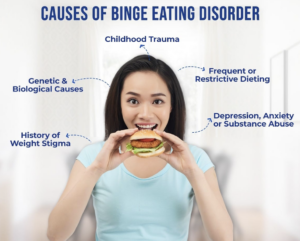Do I Have Binge Eating Disorder? Understanding Signs, Symptoms, and Treatments

Binge Eating Disorder (BED) is a prevalent yet often misunderstood condition. It involves episodes of consuming large amounts of food, accompanied by feelings of loss of control and distress. If you’re questioning whether you might have BED, understanding its signs, symptoms, and available treatments can be the first step towards recovery. This comprehensive guide will delve into the nuances of BED and explore how psychotherapy plays a crucial role in effective treatment.
What is Binge Eating Disorder?
Binge Eating Disorder is the most common eating disorder in the United States. Unlike other eating disorders, it doesn’t necessarily involve purging behaviors, such as vomiting or excessive exercise. It’s characterized by recurring episodes of eating large quantities of food, often quickly and to the point of discomfort, while feeling a lack of control over these episodes.
Identifying the Signs and Symptoms of BED
- Eating Unusually Large Amounts of Food: BED involves consuming more food than most people would eat in a similar time period under similar circumstances.
- Eating Rapidly and Until Uncomfortably Full: People with BED often eat faster than normal and continue eating even when they’re not hungry.
- Eating Alone Due to Embarrassment: Due to feelings of guilt or embarrassment, individuals may eat alone or secretly.
- Feelings of Distress, Guilt, or Shame Post-Binge: Emotional distress follows binge episodes, including feelings of disgust, guilt, or shame.
- No Use of Purging Behaviors: Unlike bulimia, binge eating doesn’t involve regular use of compensatory behaviors like vomiting or excessive exercise.
- Frequency of Episodes: Binge eating episodes typically occur at least once a week for three months and especially around the holiday season.
Understanding the Causes and Risk Factors
The exact cause of BED is unknown, but various factors contribute to its development:
- Genetic Predisposition: There’s evidence that biological factors, including genetics, may play a role in BED.
- Psychological Factors: Low self-esteem, body dissatisfaction, and a history of dieting can increase the risk of developing BED.
- Emotional Trauma: Past trauma, such as abuse or neglect, can trigger emotional eating patterns.
- Social and Cultural Influences: Societal pressures and cultural attitudes toward body shape and weight can contribute to BED.
The Impact of Binge Eating Disorder
BED can have severe psychological and physical consequences, including:
- Mental Health Issues: Anxiety, depression, and substance abuse disorders are common among those with BED.
- Physical Health Risks: Obesity, cardiovascular disease, type 2 diabetes, and other health complications are associated with BED.
Treatment Options for Binge Eating Disorder
- Psychotherapy: Cognitive-behavioral therapy (CBT) is considered the most effective treatment for BED. It helps individuals understand and change their thoughts and behaviors related to eating, body image, and emotions.
- Medication: Certain medications, including antidepressants and antiepileptic drugs, can be effective in reducing binge eating episodes.
- Nutritional Counseling: Working with a dietitian can help individuals develop a balanced approach to food and eating.
- Support Groups: Peer support groups provide a safe space to share experiences and coping strategies.
The Role of Psychotherapy in Treating BED
Psychotherapy, particularly CBT, plays a critical role in treating BED:
- Addressing Underlying Emotional Issues: Psychotherapy can help identify and address emotional triggers for binge eating.
- Developing Healthier Coping Mechanisms: Therapy provides alternative strategies for coping with stress, anxiety, and other emotions.
- Improving Self-Esteem and Body Image: Psychotherapy often includes components that focus on improving self-esteem and addressing body image issues.
- Building Long-term Skills: Therapy equips individuals with the skills needed for long-term management of BED.
Do I Have Binge Eating Disorder? Taking the First Step Towards Recovery
If you’re struggling with symptoms of BED, remember that help is available, and recovery is possible. Acknowledging the problem and seeking professional help is the first step towards a healthier, more fulfilling life. Book Now

